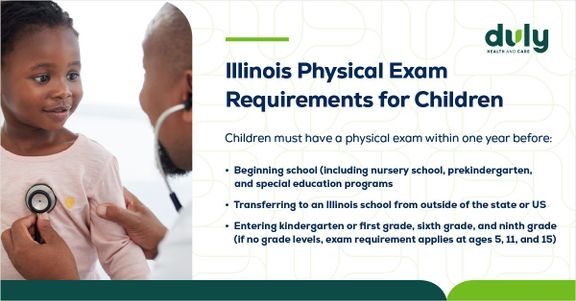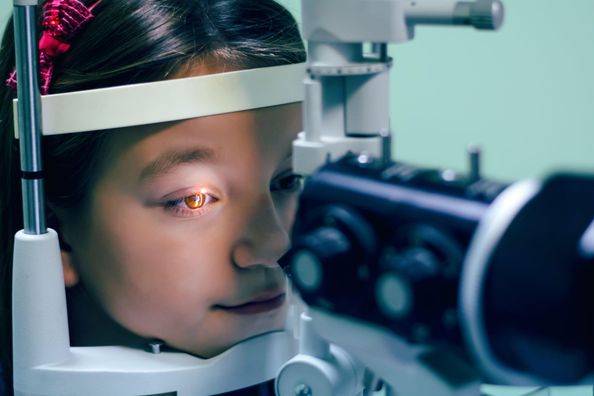Summer days are flying by, and before you know it, your little one will be walking through those school doors again. Between shopping for new backpacks and organizing carpools, there’s one important item that might slip your mind: your child’s physical exam.
Whether your kiddo is starting kindergarten for the first time or gearing up for another season on the basketball court, understanding Illinois physical requirements can help you stay ahead of the game. We’re here to walk you through everything you need to know, making this process as smooth as possible for both you and your child.
Illinois School Physical Requirements: What You Need to Know
Let’s start with the basics. School-aged children should get regular check-ups. The American Academy of Pediatrics recommends completing a well-child visit once a year from age 3 to 21, but there are also certain check-ups that schools require. Illinois takes student health seriously, and for good reason. These requirements help keep all our kids healthy and ready to learn.
Key Facts at a Glance
- Illinois requires school physical exams before entering kindergarten, 6th grade, and 9th grade — and for all students transferring into the state or country.
- Physicals must be completed within one year of the school start date and submitted by October 15 (some districts may have earlier deadlines).
- Exams include: vision and hearing screenings, growth checks, immunizations, scoliosis screening, and a full health history review.
- Sports physicals are separate from school physicals and are required yearly for Illinois student-athletes.
- Duly Health and Care providers offer school and sports physicals across Chicagoland, including Naperville, Plainfield, and surrounding suburbs.

Also read: The Back-to-School Checklist
Grade-Specific Requirements
- Kindergarten & Preschool Students: If your child is entering school for the first time, they’ll need a complete physical exam. This includes a thorough health assessment and proof that all required immunizations are current. Think of it as your child’s health passport for their educational journey.
- 6th Grade Students: Middle school brings new challenges, and that includes updated health requirements. All students entering 6th grade need another physical exam, regardless of when their last one was completed.
- 9th Grade Students: High school is a big transition, and Illinois requires another comprehensive physical as your teen enters this new chapter. This exam often includes additional screenings that are important for adolescent health.
- Transfer Students: Moving to Illinois from another state? Your child will need a new physical exam to ensure they meet our state’s specific health requirements. We know relocating can be stressful, and we’re here to help make this part easier.
Understanding Illinois Deadlines
Illinois school physical forms must be submitted by October 15th. However, many individual school districts set earlier deadlines, so we always recommend checking with your specific school. Some districts require forms by the first day of school, while others may give you a few extra weeks.
What’s Included in School Physicals
When you bring your child in for their school physical, you can expect a comprehensive health assessment that covers several key areas. Let’s walk through what happens during these important appointments.
Health History Review
We’ll start by updating your child’s complete health story. This conversation covers more than you might expect, and it’s all designed to give us the clearest picture of your child’s health. We’ll discuss:
- Any surgeries or hospital stays your child has had
- Ongoing medical conditions like asthma, birth defects, allergies, or diabetes
- Medications your child takes regularly
- Family medical history, including serious conditions in close relatives
- Any concerning symptoms you’ve noticed
- Previous injuries or illnesses
- Alcohol, drug, or tobacco use
Don’t worry if you can’t remember every detail. We’re here to help you think through your child’s health journey, and even small details can be important for keeping them healthy at school.
Physical Examination and Screenings
The hands-on portion of the exam is thorough but gentle. We’ll check your child’s:
- Vision and hearing to catch any issues that might affect learning
- Heart and lungs through listening with a stethoscope
- Abdomen to check for any concerning signs
- Height and weight to track healthy growth patterns
- Skin for any unusual marks or conditions
- Blood pressure to ensure their heart is healthy
- Spine to screen for scoliosis, especially important during growth spurts
We also assess their overall development to make sure they’re meeting the milestones for their age group.
Immunizations: Keeping Everyone Safe
Vaccines are one of the most important ways we protect not just your child, but their entire school community. Illinois requires specific immunizations, and we’ll make sure your child is current on all of them.
Required Vaccines Include:
- DTaP (Diphtheria, Tetanus, Pertussis)
- MMR (Measles, Mumps, Rubella)
- Polio vaccine
- Varicella (Chickenpox)
- Hepatitis B
- Haemophilus influenzae type b (Hib)
- Pneumococcal (PCV)
- Meningococcal vaccine (for certain age groups)
Recommended but Optional Vaccines:
- HPV vaccine (for adolescents)
- Annual flu vaccine
- COVID-19 vaccine
Laboratory Tests When Needed
While not always required, we may recommend certain lab tests based on your child’s age, health history, or specific risk factors. These might include:
- Blood work to check for anemia, iron deficiency, diabetes, or cholesterol levels
- Urine tests to screen for diabetes or kidney function
- Lead screening for younger children, especially if they live in older homes
- Tuberculosis screening if there are specific risk factors
These tests help us catch potential health issues early, when they’re most treatable.
Sports Physicals
If your child is eager to join a sports team, they’ll need a sports physical in addition to their regular school physical. These specialized exams focus on making sure your young athlete can safely participate in their chosen sport.
Sports Physical vs School Physical: What’s the Difference?
While both exams cover basic health assessments, sports physicals dig deeper into areas that directly affect athletic performance and safety. We pay special attention to:
- Heart health
- Bone and joint function
- Neurological health
- Heat tolerance & hydration education
- Nutritional status
Important timing note: Children who participate in school-sponsored athletic programs in Illinois are required to get a sports physical every year. This ensures ongoing safety as your child grows and develops throughout their athletic journey. They do not need a separate sports physical in sixth and ninth grades, when school physicals are required.
Comprehensive Athletic Screening
During your child’s sports physical, we’ll conduct specialized tests that go beyond the standard school physical:
- Cardiovascular Assessment: We’ll listen carefully to your child’s heart and may recommend an electrocardiogram (ECG) or cardiology evaluation if we detect any irregularities or if your child participates in certain high-intensity sports.
- Musculoskeletal Evaluation: We’ll check your child’s joints, muscles, and bones, looking for any weaknesses or previous injuries that might put them at risk during sports activities.
- Neurological Screening: This includes checking reflexes, balance, and coordination to ensure your child’s nervous system is functioning properly for athletic activities.
- Nutritional Assessment: We’ll evaluate your child’s eating habits, weight patterns, and overall nutritional status to ensure they have the energy and nutrients needed for optimal athletic performance and recovery.
- Mental Health Evaluation: Sports can bring both excitement and pressure. We’ll check in with your child about their emotional wellbeing, stress levels, and how they’re handling the demands of competitive activities.
We understand that every young athlete is unique. For female athletes, we’ll discuss topics like menstruation and how it might affect training and performance.
For athletes with disabilities, we’ll work together to ensure they have the support and accommodations needed to participate safely and successfully in their chosen sports.
Some Illinois schools require electrocardiograms (ECGs) for certain sports or activities. This simple, painless test measures your child’s heart rhythm and can detect potential cardiac issues that might not be obvious during a regular exam.
A Word from Our Doctor:
“Annual physicals can reveal underlying health concerns that may not show symptoms right away, such as murmurs or joint instability. By catching these issues before symptoms occur, I can reduce risk of serious injury or illness in my patients, especially with athletes.”
— Dr. Sarah Khan, MD, Pediatrician at Duly Health and Care in Naperville, Illinois
Don’t let hidden health issues sideline your child’s school year or athletic dreams – schedule their exam today. Our experienced Duly Health and Care providers make the process quick and thorough, giving you peace of mind and your child the health clearance they need to thrive.
Schedule an appointment today >
How to Prepare for Your Child’s Physical
A little preparation goes a long way in making your child’s physical exam smooth and comprehensive. Here’s how to set everyone up for success.
Scheduling Tips and Timing
- Start Early: We recommend scheduling your child’s physical as soon as summer vacation begins. Our team provides thousands of school physicals each year, and appointment slots fill up quickly during peak season.
- Allow Extra Time: If we discover something that needs follow-up testing, you’ll want plenty of time before school starts. Scheduling early gives you buffer time for any additional appointments or tests.
- Consider Your Child’s Schedule: Think about your child’s summer activities when scheduling. A physical exam the day before swim camp might not be ideal, especially if immunizations are needed.
Preparing Your Child for the Visit
- Age-Appropriate Conversations: For younger children, explain the visit in simple terms: “The doctor is going to make sure you’re healthy and ready for school.” For older kids, you can be more specific about what to expect.
- Address Concerns: If your child is nervous about shots, acknowledge their feelings and explain why vaccines are important. Sometimes bringing a favorite stuffed animal or comfort item can help.
- Involve Them in Preparation: For older children and teens, involve them in gathering their health information. This helps them become more aware of their own health history.
Required Forms and Documentation Checklist
Before Your Visit, Gather:
- School health forms (available on your school’s website or at our clinics)
- Previous medical records, if you’re new to our practice
- Current medication list with dosages
- Insurance cards and identification
What We’ll Provide:
- Completed and signed school forms
- Immunization records
- After-visit summary with any recommendations
- Sports clearance forms if applicable
Questions to Ask Your Provider
Consider Asking About:
- Any concerns you have about your child’s growth or development
- Questions about screen time, sleep habits, or nutrition
- Specific sports safety concerns
- When to schedule the next physical
- Any follow-up appointments needed
The Next Steps
Even if your child isn’t an athlete or they aren’t in a grade where they are required to have a school physical, we recommend that all children get a check-up every year. Seeing their primary care provider regularly is a great opportunity for you to receive helpful insight into how your child is growing and developing, and what to expect as they continue to grow.
Don’t wait until the last minute – schedule your child’s school or sports physical with a Duly Health and Care provider today. Our experienced pediatricians and family medicine doctors make the process quick and stress-free, so your child can focus on what matters most: learning and playing.
Health Topics:








